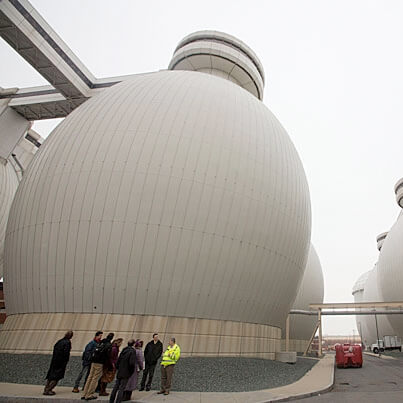News
Students from Harvard SEAS and Brazil toured the Deer Island facility in January. (Photo by Kris Snibbe, Harvard Staff Photographer.)
Climate change may not have been as prominent in the headlines in the 1980s as it is today, but it was certainly on the minds of engineers designing a new sewage-treatment plant for Boston.
Today, the massive Deer Island plant can boast of being one of the first major coastal projects that had a nearly 2-foot rise in sea level designed into its construction. That is good news to area residents because the plant — one of the nation’s largest — handles sewage from 61 Boston area municipalities and 2.5 million customers.
Built to clean up Boston Harbor, partly in response to a major lawsuit, the plant was designed to withstand a 100-year storm, then was raised an additional 1.9 feet in anticipation of possible sea-level rise. Its outflow tunnel, which disperses treated wastewater into the ocean nine miles offshore, was made larger to account for changes to the dynamics of the gravity-powered system as the sea level rises.
A group of students from Harvard and Brazil toured the plant and spoke to officials there about its design and operation. The Jan. 16 visit was part of a two-week, cooperative winter program sponsored by Harvard’s School of Engineering and Applied Sciences (SEAS), the David Rockefeller Center for Latin American Studies, and the University of São Paolo in Brazil.
This year’s subject, “Urban Adaptation to Climate Change: Resilient Cities,” brought students to Deer Island and to New York, where they toured areas affected by 2012’s Superstorm Sandy, including the Red Hook section of Brooklyn and the South Ferry Station.
The program is the latest in an annual series that began five years ago. The collaborative program between Harvard and one of Brazil’s most prestigious engineering schools alternates visits to Cambridge and Brazil, drawing roughly half of its 29 students from each institution.
Patrick Ulrich, assistant director for undergraduate studies in environmental science and engineering at SEAS, said this year’s topic was selected as a natural sequel to last year’s program on energy and climate change, which was held in Brazil. This year’s program went well, Ulrich said, with students from different countries meshing and forming friendships.
“They’ve been fantastic. The students are a really good group. They integrated … right off the bat,” he said.
Lindsay Woodson, a master’s degree student at the Harvard Graduate School of Design, said she enjoyed getting to know the course’s Brazilian students and listening to the perspectives they brought. The New York excursion to view the recovery from Sandy was most interesting to her, she said, because her academic focus is on risk and resilience.
Steven Wofsy, the Abbott Lawrence Rotch Professor of Atmospheric and Environmental Science and one of the program’s core faculty members, said a main purpose of the effort is to give engineering students direct exposure to people in the field who work daily on issues the students are learning about.
“I think it’s been spectacular,” Wofsy said. “It’s hard to decide which is the high point.”
Students spent about an hour touring Deer Island, viewing the giant, egg-shaped digesters, flares for burning off excess gas, and primary and secondary treatment areas. The visit included a talk by Stephen Estes-Smargiassi, director of planning for the Metropolitan Water Resources Authority (MWRA), which runs the plant, and Dave Duest, manager of process control at the plant.
Estes-Smargiassi gave a brief history of the plant and an overview of the MWRA system, which not only collects and processes wastewater, but also provides clean drinking water from its reservoirs...
Read the entire article in the Harvard Gazette
Topics: Environment, Climate
Cutting-edge science delivered direct to your inbox.
Join the Harvard SEAS mailing list.
Scientist Profiles
Steven C. Wofsy
Abbott Lawrence Rotch Professor of Atmospheric and Environmental Science



